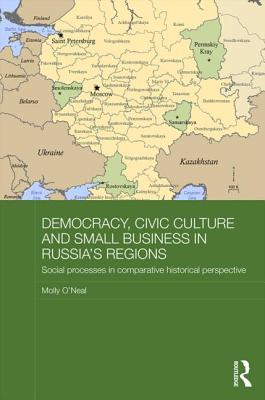Democracy, Civic Culture and Small Business in Russia's Regions
: Social Processes in Comparative Historical Perspective
(Routledge Contemporary Russia and Eastern Europe Series)
By:
Molly O'Neal
(Author)
, Molly O'Neal
(Author)
, Molly O'Neal
(Author)
, Molly O'Neal
(Author)
, Molly O'Neal
(Author)
, Molly O'Neal
(Author)
, Molly O'Neal
(Author)
, Molly O'Neal
(Author)
, Molly O'Neal
(Author)
, Molly O'Neal
(Author)
, Molly O'Neal
(Author)
, Molly O'Neal
(Author)
, Molly O'Neal
(Author)
, Molly O'Neal
(Author)
, Molly O'Neal
(Author)
, Molly O'Neal
(Author)
, Molly O'Neal
(Author)
, Molly O'Neal
(Author)
, Molly O'Neal
(Author)
, Molly O'Neal
(Author)
, Molly O'Neal
(Author)
, Molly O'Neal
(Author)
, Molly O'Neal
(Author)
, Molly O'Neal
(Author)
, Molly O'Neal
(Author)
, Molly O'Neal
(Author)
, Molly O'Neal
(Author)
, Molly O'Neal
(Author)
, Molly O'Neal
(Author)
, Molly O'Neal
(Author)
, Molly O'Neal
(Author)
, Molly O'Neal
(Author)
, Molly O'Neal
(Author)
, Molly O'Neal
(Author)
, Molly O'Neal
(Author)
, Molly O'Neal
(Author)
, Molly O'Neal
(Author)
, Molly O'Neal
(Author)
, Molly O'Neal
(Author)
, Molly O'Neal
(Author)
, Molly O'Neal
(Author)
, Molly O'Neal
(Author)
, Molly O'Neal
(Author)
, Molly O'Neal
(Author)
, Molly O'Neal
(Author)
, Molly O'Neal
(Author)
, Molly O'Neal
(Author)
, Molly O'Neal
(Author)
, Molly O'Neal
(Author)
, Molly O'Neal
(Author)
, Molly O'Neal
(Author)
, Molly O'Neal
(Author)
, Molly O'Neal
(Author)
, Molly O'Neal
(Author)
, Molly O'Neal
(Author)
, Molly O'Neal
(Author)
, Molly O'Neal
(Author)
, Molly O'Neal
(Author)
, Molly O'Neal
(Author)
, Molly O'Neal
(Author)
, Molly O'Neal
(Author)
, Molly O'Neal
(Author)
, Molly O'Neal
(Author)
, Molly O'Neal
(Author)
, Molly O'Neal
(Author)
, Molly O'Neal
(Author)
, Molly O'Neal
(Author)
, Molly O'Neal
(Author)
, Molly O'Neal
(Author)
, Molly O'Neal
(Author)
, Molly O'Neal
(Author)
, Molly O'Neal
(Author)
, Molly O'Neal
(Author)
, Molly O'Neal
(Author)
, Molly O'Neal
(Author)
, Molly O'Neal
(Author)
, Molly O'Neal
(Author)
, Molly O'Neal
(Author)
, Molly O'Neal
(Author)
, Molly O'Neal
(Author)
, Molly O'Neal
(Author)
, Molly O'Neal
(Author)
, Molly O'Neal
(Author)
, Molly O'Neal
(Author)
, Molly O'Neal
(Author)
, Molly O'Neal
(Author)
, Molly O'Neal
(Author)
, Molly O'Neal
(Author)
, Molly O'Neal
(Author)
, Molly O'Neal
(Author)
, Molly O'Neal
(Author)
, Molly O'Neal
(Author)
, Molly O'Neal
(Author)
, Molly O'Neal
(Author)
, Molly O'Neal
(Author)
, Molly O'Neal
(Author)
, Molly O'Neal
(Author)
, Molly O'Neal
(Author)
, Molly O'Neal
(Author)
, Molly O'Neal
(Author)
, Molly O'Neal
(Author)
, Molly O'Neal
(Author)
, Molly O'Neal
(Author)
, Molly O'Neal
(Author)
, Molly O'Neal
(Author)
, Molly O'Neal
(Author)
, Molly O'Neal
(Author)
, Molly O'Neal
(Author)
, Molly O'Neal
(Author)
, Molly O'Neal
(Author)
, Molly O'Neal
(Author)
, Molly O'Neal
(Author)
, Molly O'Neal
(Author)
, Molly O'Neal
(Author)
, Molly O'Neal
(Author)
, Molly O'Neal
(Author)
, Molly O'Neal
(Author)
, Molly O'Neal
(Author)
, Molly O'Neal
(Author)
, Molly O'Neal
(Author)
, Molly O'Neal
(Author)
, Molly O'Neal
(Author)
, Molly O'Neal
(Author)
, Molly O'Neal
(Author)
, Molly O'Neal
(Author)
, Molly O'Neal
(Author)
, Molly O'Neal
(Author)
, Molly O'Neal
(Author)
, Molly O'Neal
(Author)
, Molly O'Neal
(Author)
, Molly O'Neal
(Author)
, Molly O'Neal
(Author)
, Molly O'Neal
(Author)
, Molly O'Neal
(Author)
, Molly O'Neal
(Author)
, Molly O'Neal
(Author)
, Molly O'Neal
(Author)
, Molly O'Neal
(Author)
, Molly O'Neal
(Author)
, Molly O'Neal
(Author)
, Molly O'Neal
(Author)
, Molly O'Neal
(Author)
, Molly O'Neal
(Author)
, Molly O'Neal
(Author)
, Molly O'Neal
(Author)
, Molly O'Neal
(Author)
, Molly O'Neal
(Author)
, Molly O'Neal
(Author)
, Molly O'Neal
(Author)
, Molly O'Neal
(Author)
, Molly O'Neal
(Author)
, Molly O'Neal
(Author)
, Molly O'Neal
(Author)
, Molly O'Neal
(Author)
, Molly O'Neal
(Author)
, Molly O'Neal
(Author)
, Molly O'Neal
(Author)
, Molly O'Neal
(Author)
, Molly O'Neal
(Author)
, Molly O'Neal
(Author)
, Molly O'Neal
(Author)
, Molly O'Neal
(Author)
, Molly O'Neal
(Author)
, Molly O'Neal
(Author)
, Molly O'Neal
(Author)
, Molly O'Neal
(Author)
, Molly O'Neal
(Author)
, Molly O'Neal
(Author)
, Molly O'Neal
(Author)
, Molly O'Neal
(Author)
, Molly O'Neal
(Author)
, Molly O'Neal
(Author)
, Molly O'Neal
(Author)
, Molly O'Neal
(Author)
, Molly O'Neal
(Author)
, Molly O'Neal
(Author)
, Molly O'Neal
(Author)
, Molly O'Neal
(Author)
, Molly O'Neal
(Author)
, Molly O'Neal
(Author)
, Molly O'Neal
(Author)
, Molly O'Neal
(Author)
, Molly O'Neal
(Author)
, Molly O'Neal
(Author)
, Molly O'Neal
(Author)
, Molly O'Neal
(Author)
, Molly O'Neal
(Author)
, Molly O'Neal
(Author)
, Molly O'Neal
(Author)
, Molly O'Neal
(Author)
, Molly O'Neal
(Author)
Manufacture on Demand
Ksh 35,450.00
 Jacket, Women
Jacket, Women
 Woolend Jacket
Woolend Jacket
 Western denim
Western denim
 Mini Dresss
Mini Dresss
 Jacket, Women
Jacket, Women
 Woolend Jacket
Woolend Jacket
 Western denim
Western denim
 Mini Dresss
Mini Dresss
 Jacket, Women
Jacket, Women
 Woolend Jacket
Woolend Jacket
 Western denim
Western denim
 Mini Dresss
Mini Dresss
 Jacket, Women
Jacket, Women
 Woolend Jacket
Woolend Jacket
 Western denim
Western denim
 Mini Dresss
Mini Dresss
 Jacket, Women
Jacket, Women
 Woolend Jacket
Woolend Jacket
 Western denim
Western denim
 Mini Dresss
Mini Dresss














































